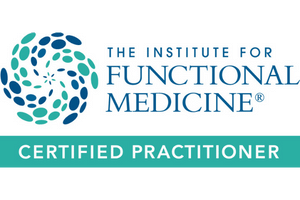What is functional medicine?
Do you want to understand the science behind functional medicine? Then you're in the right place! We've got the scoop on functional medicine, how it works, and how it can help you live a healthier life. Get all the answers in our comprehensive guide to what is functional medicine here.
Are you curious about what functional medicine is and how it can help you?
Functional medicine is a science-based approach to healthcare that focuses on identifying and addressing the root causes of acute or chronic disease or dysfunction, whatever a person is experiencing.
It is personalized medicine that takes into account the individual’s unique genetic, environmental, and lifestyle factors that can influence long-term health and complex, chronic multifaceted health issues.
It is an evolution in the practice of medicine that better addresses the healthcare needs of the 21st century.
Functional medicine looks at the body as a whole, rather than just treating symptoms in isolation. It is based on the understanding that all systems in the body are connected and must be taken into account when developing an individualized health plan.
It also emphasizes the importance of nutrition, life habits, and emotional well-being in achieving and maintaining optimal health.
This article will provide an in-depth look at what functional medicine is and the benefits it can offer. We'll discuss how functional medicine differs from conventional medicine, the science behind it, and how it can help you achieve your health goals.
Get ready to learn about the power of functional medicine and how it can help you live a healthier life!
What medical conditions are best for a functional medicine approach?
Functional medicine is an approach to health care that focuses on identifying and addressing the root causes of illness and acute or chronic health conditions.
It is a personalized approach that considers the whole person, including life habits, diet, environment, and genetic factors.
Common conditions that are best suited for a functional medicine approach include: chronic pain conditions, fatigue syndrome, obesity, diabetes, digestive issues, autoimmune disorders, and hormonal imbalances.
What is the functional medicine approach?
Functional medicine is an evidence-based approach to health care that focuses on the underlying causes of disease and the body's own healing mechanisms.
It emphasizes the importance of a personalized approach to health care that takes into account the unique genetic, own medical history, family medical history, environmental, and life habit factors of the individual patient.
Functional medicine practitioners use a variety of tools to assess and treat a wide range of conditions, from chronic diseases to mental health conditions.
They focus on identifying and addressing the root causes of health problems, rather than simply treating symptoms.
The goal of a functional medicine doctor or practitioner is to restore balance in the body and promote optimal health and well-being.
How is functional medicine different than regular medicine?
Functional medicine is a form of healthcare that focuses on identifying and addressing the root cause of a diagnosis of illness or condition, rather than just treating the symptoms.
It takes into account the patient's life choices, environment, and genetic factors to create a unique treatment plan for the diagnosis or patient dysfunction.
Functional medicine also emphasizes preventative care and proactive strategies to maintain health, such as nutrition and exercise.
Regular medicine, on the other hand, tends to focus more on treating the symptoms of a condition affecting patients, rather than to focus on the underlying cause.
Can functional medicine help anxiety?
Yes, a functional medicine doctor treat and can help with anxiety. . Functional medicine doctor takes an approach that is more holistic approach to health care that looks at the underlying causes of a condition rather than just treating the symptoms.
Functional medicine practitioners use a variety of techniques, including nutrition, life habits changes, stress management, and supplements, to help reduce anxiety and improve overall health.
By addressing the root causes of anxiety, a functional medicine practitioner, can help reduce symptoms and improve overall wellbeing.
What is the difference between functional medicine and functional nutrition?
Functional medicine is an approach to healthcare that focuses on identifying and addressing the underlying cause of chronic disease first. It takes into account the entire person and looks at all the factors that may be contributing to the person's health issues.
Functional nutrition is a subset of functional medicine and focuses specifically on the role of nutrition in health and disease. A health coach often helps patients with functional nutrition.
It looks at how the food we eat affects our health, with an emphasis on understanding how different nutrients interact with each other and with the body to maintain health or cause disease.
Have any Functional Medicine doctors written any books?
There are many functional medicine doctors who have written books, including Mark Hyman, MD, Jeffrey Bland, PhD, David Perlmutter, MD, and Andrew Weil, MD. Other notable authors in functional medicine institute include Deepak Chopra, MD, Joseph Pizzorno, ND, and Tieraona Low Dog, MD. These authors have written books on topics within functional medicine services such as nutrition, gut health, stress management, and lifestyle medicine.
Some of the most popular books include:
• The UltraMind Solution by Mark Hyman, MD
• The Blood Sugar Solution by Mark Hyman, MD
• The End of Dieting by Joel Fuhrman, MD
• Eat to Live by Joel Fuhrman, MD
• Why Isn't My Brain Working? by Datis Kharrazian, PhD
• The Wahls Protocol by Terry Wahls, MD
• The Plant Paradox by Steven R. Gundry, MD
• The Autoimmune Solution by Amy Myers, MD
• The Adrenal Reset Diet by Alan Christianson, NMD
How does a doctor become certified in Functional Medicine?
In order to become certified in Functional Medicine, a functional medicine doctor must complete an intensive training program. This specialized training program includes a comprehensive curriculum of courses, seminars, and hands-on clinical training.
The program focuses on the use of evidence-based, patient-centered care to address the underlying causes of chronic health problems. It also covers the use of nutrition, life habit interventions, and other natural therapies. Functional medicine doctors certainly do still use prescription drugs, in addition to the various other treatment options.
After completing the program, the doctor must pass an exam to become certified.
Can a functional medicine doctor help with chronic illness?
Yes, a functional medicine doctor can be a great resource for those with chronic illness. . Functional medicine doctors often takes a holistic approach to health and focuses on the underlying causes of disease, rather than just treating symptoms.
A functional medicine doctor will look at the entire person – their choices, diet, environment, and genetics – and develop a personalized plan to help manage chronic illness.
This plan may include dietary changes, life habits modifications, and supplementation, as well as working with other mainstream medicine healthcare professionals to ensure the best possible outcome.
Is functional medicine the same as a naturopath?
No, functional medicine and naturopathy are two different approaches to healthcare. Functional medicine is a science-based, patient-centered approach to healthcare that looks to address the essential origins of diseases and promote health and well-being.
Naturopathy is a holistic approach to healthcare that focuses on natural remedies and treatments such as herbs, nutrition, and life habits modifications. Both approaches can be beneficial for overall health, but they are not the same.
What is the functional medicine model?
The functional medicine model is an approach to healthcare that focuses on identifying and addressing the root causes of illness and disease. It is based on the idea that the body is an interconnected system, and that the root causes of many diseases can be traced to imbalances in this system.
Functional medicine practitioners use a combination of evidence-based medical practices and lifestyle interventions to restore balance and optimize health. This includes looking at the patient’s diet, life habits, environment, and genetics, as well as identifying any underlying imbalances in the body’s systems. By addressing these underlying issues, functional practitioners are able to help prevent, treat, and reverse chronic illnesses and diseases.
What is functional medicine?
Functional medicine is an approach to healthcare that focuses on identifying and addressing the root cause of health issues, rather than simply treating symptoms. It takes into account the whole of the person, including their physical, emotional, mental, and spiritual health, as well as life habits and environmental factors.
It is a personalized, systems-oriented approach that emphasizes prevention and wellness. It also seeks to uncover and address the root causes of chronic and complex diseases, such as diabetes, heart disease, and autoimmune conditions.
What does functional medicine treat?
Functional medicine is a holistic approach to healthcare for patients that focuses on identifying and addressing the essential origins of chronic disease itself. It looks at the entire patient, including life habits, diet, environment, and genetics, to determine the root cause of a health issue and create a personalized treatment plan.
Functional medicine treatments can be used with conventional medicine to treat a wide range of conditions, including chronic pain, digestive issues, autoimmune diseases, mental health issues, and more.
What is the difference between homeopathy and holistic medicine?
Homeopathy is a form of alternative medicine that is based on the idea that “like cures like”. It works by using highly diluted substances that are believed to cause the same symptoms as the illness being treated. Homeopathic remedies are meant to stimulate the body's own healing processes.
Holistic medicine, on the other hand, is a more comprehensive approach to health care that takes into account the entire person, including physical, mental, emotional, and spiritual aspects. It focuses on treating the root cause of illness, rather than just the symptoms, and uses a variety of modalities, such as nutrition, life habits changes, herbal remedies, and stress management.
How can a Family Medicine doctor incorporate functional medicine practices?
Family doctors can incorporate functional medicine practices by focusing on the root causes of chronic disease, rather than just the symptoms. A Functional Medicine doctor looks at the body holistically and takes into account life habits, environment, genetics, and nutrition when treating patients. Functional medicine doctors use a take a very comprehensive medical history. That medical history often starts with a detailed questionnaire the patient can fill out at home when they are relaxed and can think through the questions.
Family doctors can also use nutrition, life habit changes, and supplements to help their patients achieve better health and wellness. They can also use the principles of functional medicine to identify and address the upstream causes of chronic diseases, such as diabetes, heart disease, and obesity.
By utilizing the functional medicine model, Family doctors can provide patient centered care to their patients with a comprehensive approach to health care.
Doe the Cleveland Clinic use Functional Medicine?
Yes, the Cleveland Clinic does use Functional Medicine. Functional Medicine is a comprehensive strategy and individualized approach to healthcare that looks at the body as a whole and focuses on the essential origins of disease.
Functional Medicine doctors at Cleveland Clinic use evidence-based treatments such as nutrition, lifestyle changes, and supplements to help treat chronic conditions and promote overall health and wellness.
The Cleveland Clinic offers a Functional Medicine program that provides personalized care and treatment plans for patients.
How does Functional Medicine compare to Chinese Medicine?
Functional Medicine and Chinese Medicine are two distinct healing modalities that share some common principles. Both disciplines focus on addressing the underlying causes of illness, rather than the typical conventional medicine approach of just treating the symptoms.
Functional Medicine is a science-based approach to healthcare that looks at the body as an interconnected system of systems, and seeks to identify and address the upstream causes of illness.
It is a patient-centered approach that focuses on understanding the individual's unique physiology, lifestyle, and environment in order to develop personalized treatment plans.
Chinese Medicine, on the other hand, is based on the ancient Chinese philosophy of balance, and seeks to restore balance to the body through the use of herbs, acupuncture, and other modalities.
It is a comprehensive strategy that looks at the individual holistically, taking into account the physical, emotional, and spiritual aspects of health.
Can functional medicine help with acute care issues?
Yes, functional medicine can help with these issues. Functional medicine is an integrative approach to healthcare that focuses on addressing the root cause of health issues, rather than treating symptoms. This approach can be applied to issues such as infections, injuries, and other acute conditions.
A functional medicine practitioner uses a variety of tools and techniques to help the body heal itself and restore balance, such as lifestyle changes, nutritional support, and natural therapies.
By addressing the underlying cause of the acute issue, functional medicine doctors can help to reduce the risk of further complications and promote long-term health.
How can functional medicine be affordable?
Functional medicine can be affordable through several methods. The first is to look for practitioners who offer sliding scale fees or payment plans. Additionally, many functional medicine practitioners accept insurance, and many insurance companies are beginning to cover functional medicine treatments.
Lastly, some practitioners may offer discounts for online consultations, or discounts for purchasing multiple sessions in advance.
I personally previously had a brick and mortar functional medicine practice in Austin, Texas. Now I serve patients primarily via telemedicine virtual primary care and virtual urgent care. My functional medicine background informs my perspective on everything I do and I am able to give patients the benefit of that without the very high fees. I believe accessibility is an important part of providing good healthcare.
What is the Institute for Functional Medicine?
The Institute for Functional Medicine (IFM) is an international non-profit organization that promotes a systems-oriented approach to healthcare. It focuses on treating the full person, not just their symptom, and emphasizes the importance of understanding the essential origins of disease.
IFM offers educational programs, research support, and clinical resources to healthcare practitioners worldwide. The organization is committed to advancing the practice of functional medicine and helping a functional medicine practitioner to integrate this approach into their practice.
What is the IFM Clinical Matrix?
The IFM Clinical Matrix is a comprehensive system developed by the Institute for Functional Medicine (IFM) to help healthcare practitioners assess, diagnose, and treat complex chronic conditions. It is a framework for understanding the essential origins of a chronic disease or illness, and provides a roadmap for developing personalized treatment plans.
The Matrix consists of six core components that provide a systematic approach to patient care: patient and comprehensive medical and family history, physical exam, laboratory testing, functional medicine assessment, lifestyle interventions, and clinical outcomes. The Cleveland Clinic uses this very matrix in their functional medicine clinic.
By utilizing this approach, practitioners can identify the root cause of an individual's health condition and develop a comprehensive treatment plan that addresses the root causes.
Who can become certified by the Institute for Functional Medicine?
The Institute for Functional Medicine offers certification to health care professionals who have completed the required training and have demonstrated a commitment to the principles of Functional Medicine. This includes physicians, nurses, nurse practitioners, dietitians, nutritionists, health coaches, and other health professionals. To become certified, applicants must complete a series of courses, assessments, and exams that cover the principles and practice of Functional Medicine.
The Institute for Functional Medicine offers certification programs for both healthcare practitioners and health coaches. Practitioners must have a minimum of a master's degree in a health-related field, and must have completed at least 300 hours of coursework and clinical experience in functional medicine. Health coaches must have a minimum of a bachelor's degree and must have completed at least 150 hours of coursework and clinical experience in functional medicine.
What are some effective alternative treatments for inflammatory diseases?
There are many alternative treatments for inflammatory diseases, such as acupuncture, herbal remedies, massage, and chiropractic care.
Dietary modifications, such as avoiding foods that can trigger inflammation, have also been found to be effective.
Additionally, lifestyle modifications, such as getting regular exercise, managing stress, and getting enough sleep, can help reduce inflammation.
Supplements, such as omega-3 fatty acids, turmeric, and probiotics, can also help reduce inflammation.
Can functional medicine help autoimmune diseases?
Yes, functional medicine can help with autoimmune diseases. Functional medicine focuses on identifying and addressing the essential origins of disease, rather than just treating the symptom. It uses a comprehensive approach to analyze a person's lifestyle, environment, and genetics to identify potential triggers of autoimmune disease.
By targeting the root cause of the disease, a functional medicine practitioner can help reduce inflammation and improve overall health. Additionally, functional medicine practitioners may recommend dietary changes, supplements, and other lifestyle components and modifications to help manage and reduce the symptoms of autoimmune diseases.
I believe that the functional medicine approach to treating autoimmune diseases is one of the most powerful uses. It gives so many more tools than what conventional doctors use.
What is another name for functional medicine?
Functional medicine is also sometimes referred to as “root-cause” medicine. This is because functional medicine focuses on diagnosis and finding the root issue that's causing a patient's manifestation of disease.
What is difference between integrative and functional medicine?
Integrative medicine is a holistic approach to health that combines traditional medical treatments with complementary and alternative therapies. It emphasizes the importance of understanding the connection between mind, body, and spirit, and seeks to treat the entire person rather than just the symptom of an illness.
Functional medicine is a form of integrative medicine practiced that focuses on addressing the upstream causes of illness, rather than just treating the symptom like traditional medicine does. It seeks to identify and address the origins of chronic diseases and utilizes lifestyle interventions such as nutrition and exercise to promote optimal health. It also looks at how the environment and genetics can impact health.
Why switch to functional medicine?
Functional medicine assists in pinpointing the necessary alterations for achieving optimal health. In this approach, your physician acts as a mentor, crafting a customized plan tailored to your schedule and needs, guiding you towards becoming the healthiest version of yourself. Additionally, they offer ongoing support through periodic check-ins.
What is another way to say holistic approach?
Another way to say this could be "comprehensive strategy," "integrated method," "all-encompassing perspective," or "whole-systems thinking." These phrases convey the idea of considering all aspects or elements of a situation, problem, or system when developing a solution or understanding.
What is functional medicine for a physician assistant or a nurse practitioner?
Functional medicine is a comprehensive strategy to healthcare that focuses on finding the root cause of disease, rather than simply treating physical manifestations. It involves working with patients to develop personalized health plans that are tailored to their individual needs and lifestyle. This type of medicine is designed to address the essential origins of illness, rather than simply treating the signs. It also involves looking at how lifestyle, nutrition, environment, and genetics can affect overall health. A Physician Assistant and a Nurse Practitioner who practice functional medicine are trained to assess, diagnose, and treat patients in a way that is consistent with this approach.
What is functional medicine doing for hormonal changes?
Functional medicine is a holistic approach to health care that focuses on the underlying causes of what a person is experiencing. It takes into account the patient's lifestyle, diet, environment, genetics, and other factors to identify the root cause of health issues.
When it comes to hormonal changes, the functional medicine model looks at how hormones interact with the body as a whole system. It looks at how the endocrine system, digestive system, immune system, and nervous system all interact to create balance and harmony within the body. Functional medicine doctors use lifestyle changes, nutrition, supplements, and other therapies to help support the body's natural ability to balance hormones. This approach can help to reduce symptoms associated with hormonal imbalances such as fatigue, mood swings, weight gain, and more.
Conclusion
Functional medicine is an evidence-based approach to healthcare that focuses on treating the root cause of a patient’s health issues. By combining traditional medicine with lifestyle changes, functional medicine practitioners can provide personalized care that helps patients get to the bottom of their health issues and achieve long-term wellness.
If you’re looking for a more holistic approach to healthcare, functional medicine could be the perfect fit for you. With its personalized care and focus on addressing the root cause of health issues, it’s no wonder so many people are turning to functional medicine for their healthcare needs. Give it a try and see how it can help you reach your health and wellness goals!
Whether you’re looking for help with a chronic health condition or just want to optimize your health, functional medicine can provide the tools and support you need. So take the first step and reach out to a functional medicine doctor today – you’ll be glad you did!






